|
|
|
Sort Order |
|
|
|
Items / Page
|
|
|
|
|
|
|
| Srl | Item |
| 1 |
ID:
164173
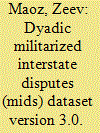

|
|
|
|
|
| Summary/Abstract |
We introduce the new, substantially updated, and revised version of the Dyadic Militarized Interstate Disputes (MIDs) dataset. We discuss the underlying logic of constructing dyadic MIDs and demonstrate that these operations generate significant differences between the actual occurrence and properties of MID dyads and those extracted from machine-generated programs such as EUGene, or from the MID participant dataset. We provide some descriptive measures of dyadic MIDs over the period of 1816 to 2010 and compare some of the key dyadic results on the correlates of MIDs using different datasets. We discuss the theoretical and empirical implications of our results.
|
|
|
|
|
|
|
|
|
|
|
|
|
|
|
|
| 2 |
ID:
164167
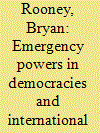

|
|
|
|
|
| Summary/Abstract |
Scholars argue that institutions in democracies constrain leaders and prevent international conflict. However, many democracies specify rules of governance in times of emergency that divert substantial power to the head of state. The manipulation of these “emergency powers” provides a rational motivation for conflict. Using a novel data set of emergency provisions within democracies, I test the relationship between emergency power strength and conflict propensity using several steps to achieve causal inference, including an instrumental variable analysis that exploits the specificity of the state’s constitution as a plausibly exogenous determinant of emergency power strength. I find that emergency power strength is a strong predictor of conflict onset in democracies in each test and that states with strong emergency powers are substantially more likely to enact a state of emergency due to an international conflict. I conclude with a discussion of my findings and avenues of future research using these data.
|
|
|
|
|
|
|
|
|
|
|
|
|
|
|
|
| 3 |
ID:
164168
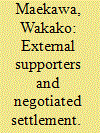

|
|
|
|
|
| Summary/Abstract |
External supporters have heterogeneous preferences over civil war outcomes depending on the issues at stake. In this article, the bargaining model and empirical study show that such preferences of external supporters need to be considered not only when analyzing the causes of support but also when analyzing how they affect a conflict. By adding an external supporter to a traditional conflict bargaining model as a strategic actor who receives a payoff from the political division, this article investigates how the preferences of external supporters influence the likelihood of a peace agreement in civil wars over a government. I demonstrate that a peace agreement is more likely to happen when the external supporters of the government side are not satisfied with the current political status quo of the supported state. The empirical analysis of political civil wars from 1976 to 2009 supports the implications of the bargaining model.
|
|
|
|
|
|
|
|
|
|
|
|
|
|
|
|
| 4 |
ID:
164170
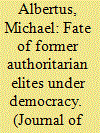

|
|
|
|
|
| Summary/Abstract |
Why do some former authoritarian elites return to power after democratization through reelection or reappointment to political office, or by assuming board positions in state-owned or major private enterprises, whereas others do not and still others face punishment? This article investigates this question using an original data set on constitutional origins and the fate of the upper echelon of outgoing authoritarian elites across Latin America from 1900 to 2015. I find that authoritarian elites from outgoing regimes that impose a holdover constitution that sticks through democratization are more likely to regain political or economic power—especially through national positions where the potential payoffs are largest—and less likely to face severe or nominal punishment. I also find a positive role for political capital among former elites. These results are robust to alternative explanations of authoritarian elites’ fate and using instrumental variables to address potential endogeneity. The findings have important implications for democratic consolidation and quality.
|
|
|
|
|
|
|
|
|
|
|
|
|
|
|
|
| 5 |
ID:
164166
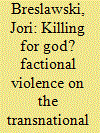

|
|
|
|
|
| Summary/Abstract |
Why are some factions fighting for greater national self-determination (SD) more violent than others? While previous explanations of violence in these disputes have focused on the number of factions, their internal structures, and power distributions among factions, we find many factions that do not follow the expectations of these theories. In this article, we center on religious ideology, its unique transnational character, and the opportunity it creates for political elites from competing factions within the same SD movement to mobilize support. We argue that “religious factions” have a greater incentive to use violence than other factions. Violence serves as a costly signal, and it can be used to demonstrate a faction’s religious credentials to transnational networks and contacts, as they compete with each other on the international stage for the same potential benefactors. We code original data on the religious ideology of factions. We find that an increasing number of religious factions is associated with increased religious faction use of violence. Furthermore, our findings point to a critical insight: it is not religious ideology, but competition between religious factions, that generates violence.
|
|
|
|
|
|
|
|
|
|
|
|
|
|
|
|
| 6 |
ID:
164171
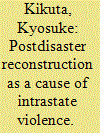

|
|
|
|
|
| Summary/Abstract |
Despite growing concerns about the effects of environmental changes, we only have disparate and seemingly contradictory findings about the relationship between natural disasters and intrastate violence. This article addresses that problem by introducing postdisaster reconstruction as a primary explanatory variable for intrastate violence. I extend bargaining theory to predict that postdisaster reconstruction causes a commitment problem, which in turn incentivizes warring parties to fight for the strategic opportunities of reconstruction. Using an instrumental variable approach, I provide an empirical test with a subnational data set for Sri Lanka before and after the 2004 Tsunami. Consistent with my expectations, housing reconstruction increased the number of violent events, while housing destruction had no discernible impact on violence.
|
|
|
|
|
|
|
|
|
|
|
|
|
|
|
|
| 7 |
ID:
164172


|
|
|
|
|
| Summary/Abstract |
Some terrorist organizations provoke their targets into deploying massive countermeasures, allowing terrorists to mobilize a greater share of their audience. Why would a government pursue such a costly strategy if it only strengthens the opponent? I develop a signaling model of terrorism, counterterrorism, and recruitment. If a target government is unsure whether the terrorists’ audience is sympathetic to the cause, weaker groups sometimes bluff strength by attacking. To check this bluff, governments sometimes respond to attacks with large-scale operations, even though they know they might be overreacting. Comparative statics reveal that overreaction regret is most likely when the target is wealthy and large operations are more effective. Thus, a selection effect creates the false impression that provocation is most effective against geopolitically privileged targets.
|
|
|
|
|
|
|
|
|
|
|
|
|
|
|
|
| 8 |
ID:
164165
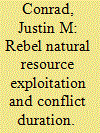

|
|
|
|
|
| Summary/Abstract |
How does natural resource wealth influence the duration of civil conflicts? We theorize that the exploitation of natural resources can strengthen rebels’ “power to resist” the government, but this depends on how rebels earn funding from those resources. Distinguishing between the extortion and smuggling of natural resources, we posit that smuggling in particular is more likely to give rebels the flexibility and mobility needed to effectively resist government repression. We then test this proposition empirically using new data that identify not only whether rebels profit from resources but also how they do so. We find that only when rebels smuggle natural resources do civil conflicts last significantly longer. In contrast, conflicts in which rebel groups earn money from extorting natural resource production are not significantly more likely to endure. This finding is of special interest because past work has largely ignored how rebels earn income from natural resources and the implication this distinction might have on conflict processes.
|
|
|
|
|
|
|
|
|
|
|
|
|
|
|
|
| 9 |
ID:
164169


|
|
|
|
|
| Summary/Abstract |
From armed-building occupations to fisticuffs between protesters and police at otherwise peaceful demonstrations, protest violence is an essential part of the politics of protest. In this article, I argue that state capacity is central to understanding why some protests are violent. In particular, this article explores two facets of state capacity—coercive capacity and state authority—arguing that where the state is treated as a relevant authority, the likelihood that protesters will employ violent tactics decreases. Using original data on Mexican protest events, I demonstrate that higher levels of state authority reduce violent protest but that increased coercive capacity, especially where state authority is weak, is associated with a greater likelihood of protest violence. This article contributes to our understanding of the influence of state capacity on protest violence and suggests that attentiveness to subnational variations in state capacity can help us better understand the violence.
|
|
|
|
|
|
|
|
|
|
|
|
|
|
|
|
|
|
|
|
|